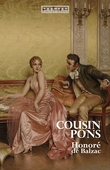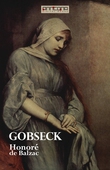
Lägg till önskelistan
Gaudissart II (The Human Comedy: Scenes from Parisian Life) e-bok
Pris
45 kr
It is sometimes difficult to know who most deserves our judgement.
Do we look down more upon a shop owner for inventing a royal backstory for one of his items - or is the customer who believes the story even worse?
Set in 19th century Paris, Honoré de Balzac's short story sees an English woman looking to buy a shawl in a shop.
The owner sees a chance to con a foreigner by claiming the shawl was once owned by Empress Josephine, once the wife of Napoleon Bonaparte.
Will she buy the story - ...
E-Bok
45 kr
Pris
Förlag
Saga Egmont
Utgiven
13 December 2022
Längd
7 sidor
Genrer
Noveller, Romaner, Deckare, Skönlitteratur
Språk
English
Format
epub
Kopieringsskydd
Vattenmärkt
ISBN
9788726668131
It is sometimes difficult to know who most deserves our judgement.
Do we look down more upon a shop owner for inventing a royal backstory for one of his items - or is the customer who believes the story even worse?
Set in 19th century Paris, Honoré de Balzac's short story sees an English woman looking to buy a shawl in a shop.
The owner sees a chance to con a foreigner by claiming the shawl was once owned by Empress Josephine, once the wife of Napoleon Bonaparte.
Will she buy the story - and the shawl?
Named after Felix Gaudissart, a travelling salesman who appears in other Balzac tales, ´Gaudissart II´ demonstrates Blazac's skills as he portrays greed, dishonesty, and gullibility to perfection.
´Gaudissart II´ will delight any reader familiar with Balzac's body of work.
Honoré de Balzac (1799-1850) was a French novelist and playwright, most famous for a sequence of novels, collectively called 'The Human Comedy'. His signature style was a warts-and-all representation of post-Napoleonic French life, rich in detail and featuring complex, unfiltered characters.
The style means Balzac is regarded as one of the pioneers of European literary realism. He is named as an influence on writers including Emile Zola, Henry James, Charles Dickens and Gustave Flaubert.
The first novel he published under his own name was 'Les Chouans' in 1829. In 1834 he hit upon the idea of grouping his novels together to record all of society. The result, over a period of years, was 'The Human Comedy', which comprised three categories: 'Analytic Studies'; 'Philosophical Studies'; and 'Studies of Manners'.












